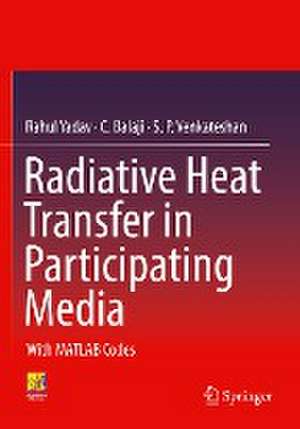Radiative Heat Transfer in Participating Media: With MATLAB Codes
Autor Rahul Yadav, C. Balaji, S. P. Venkateshanen Limba Engleză Paperback – 3 sep 2023
| Toate formatele și edițiile | Preț | Express |
|---|---|---|
| Paperback (1) | 554.05 lei 39-44 zile | |
| Springer International Publishing – 3 sep 2023 | 554.05 lei 39-44 zile | |
| Hardback (1) | 644.95 lei 3-5 săpt. | |
| Springer International Publishing – 2 sep 2022 | 644.95 lei 3-5 săpt. |
Preț: 554.05 lei
Preț vechi: 692.57 lei
-20% Nou
Puncte Express: 831
Preț estimativ în valută:
106.02€ • 113.37$ • 88.40£
106.02€ • 113.37$ • 88.40£
Carte tipărită la comandă
Livrare economică 14-19 aprilie
Preluare comenzi: 021 569.72.76
Specificații
ISBN-13: 9783030990473
ISBN-10: 3030990478
Pagini: 193
Ilustrații: XVI, 193 p. 79 illus., 1 illus. in color.
Dimensiuni: 168 x 240 mm
Ediția:1st ed. 2023
Editura: Springer International Publishing
Colecția Springer
Locul publicării:Cham, Switzerland
ISBN-10: 3030990478
Pagini: 193
Ilustrații: XVI, 193 p. 79 illus., 1 illus. in color.
Dimensiuni: 168 x 240 mm
Ediția:1st ed. 2023
Editura: Springer International Publishing
Colecția Springer
Locul publicării:Cham, Switzerland
Cuprins
Introduction.- Review of Literature.- Mathematical Formulation.- Radiative Heat Transfer in Cylindrical Geometries.- Radiative Heat Transfer in Conical Geometries.- Radiative Heat Transfer in Three Dimensional Geometries.- AI Based Solution to Practical Radiant Heating Problems.- Conclusions And Future Perspective.
Notă biografică
Dr Rahul Yadav completed his PhD in Mechanical Engineering from IIT Madras in the year 2018 and served as an Institute Post Doctoral Fellow at IIT Kanpur for 2.5 years. He has more than 7 years of experience as a researcher in radiative heat transfer in participating media. He has around 6 publications to his credit in reputed international journals in topics related to computational radiative heat transfer and neural networks. He is a reviewer for several international journals. He has been awarded a pre-doctoral fellowship from IIT Madras and is also a recipient of Institute Post-Doctoral Fellowship from IIT Kanpur.
Dr. C Balaji is currently T. T. Narendran Chair Professor in the Department of Mechanical Engineering at the Indian Institute of Technology (IIT) Madras, India. He graduated in Mechanical Engineering from Guindy Engineering College, Chennai, in 1990 and obtained his M.Tech. (1992) and Ph.D. (1995) from IIT Madras in the area of heat transfer. His areas of interest include heat transfer, computational radiation, optimization, inverse problems, satellite meteorology, and atmospheric sciences. He has more than 200 international journal publications to his credit and has guided 30 students so far. Prof. Balaji has several awards to his credit and notable among them include Young Faculty Recognition Award of IIT Madras (2007) for excellence in teaching and research, K.N. Seetharamu Award and Medal for excellence in Heat Transfer Research (2008), Swarnajayanthi Fellowship Award of the Government of India (2008–2013), Tamil Nadu Scientist Award (2010) of the Government of Tamil Nadu, Marti Gurunath Award for excellence in teaching (2013), and Mid-Career Research Award (2015) both awarded by IIT Madras. He is Humboldt Fellow and Elected Fellow of the Indian National Academy of Engineering. Prof. Balaji has authored 8 books.
Prof. S. P. Venkateshan obtained his Ph.D. from the Indian Institute of Science (IISc), Bangalore, in 1977. After spending three years at Yale University, he joined Indian Institute of Technology (IIT) Madras in 1982. He has been teaching subjects related to thermal Engineering to both UG and PG students for the past 32 years. He has published extensively and has more than 100 publications to his credit. The areas of his interest include interaction of natural convection with radiation, numerical and experimental heat transfer, heat transfer in space applications, and radiation heat transfer in participating media and instrumentation. Prof. Venkateshan has been Consultant to ISRO, DRDO, and BHEL in India and NASA in the USA. He has three patents to his credit in the area of instrumentation. He has also guided about 30 scholars toward the Ph.D. and a similar number of scholars toward the M.S. (by research) degree at IIT Madras.
Textul de pe ultima copertă
This book aims at providing a computational framework of radiative heat transfer in participating media. The book mainly helps engineers and researchers develop their own codes for radiative transfer analysis, starting from simple benchmark problems and extending further to industry scale problems. The computations related to radiative heat transfer are very relevant in iron and steel manufacturing industries, rocket exhaust designing, fire resistance testing, and atmospheric and solar applications. The methods to accurately treat the non-gray nature of the participating gases such as H2O, CO2, and CO are discussed along with considering particle radiation. The solver development based on these methods and its application to a variety of industry problems and different kind of geometries is a significant attraction in the book. The last section of the book deals with the use of artificial neural networks and genetic algorithm-based optimization technique for solving practical problemsof process parameter optimization in industry. This book is a comprehensive package taking the readers from the basics of radiative heat transfer in participating media to equip them with their own solvers and help to apply to industry problems.
Caracteristici
Provides solution to governing equations using finite volume method Presents overview of how to modify the solution method in case of different coordinate systems and geometries Discusses methods to encounter gas and particle spectral nature
